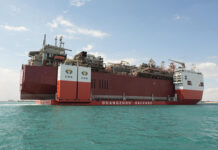
An estimated 30% of the food produced for human consumption globally is wasted within the food supply chain, according to a study by the Food and Agriculture Organization of the United Nations (FAO).
Technologies currently under development will prevent food losses, from smart containerisation to increased imagery enabling decision making on perishables to be quick and precise. Liquids in tank containers also see major losses, and several innovations are under development to improve efficiencies.
“Food loss specific to our business area happens through oxidation, cross-contamination, saturation and desaturation,” explains Sidon van Laarhoven, CEO of Mega-Inliner, which has a bag-in-tank ISO tank solution that boasts significantly reduced emissions for unlined ISO tank containers and flexitank/bags in standard shipping containers.
“Such loss is highly common using conventional tank containers,” said van Laarhoven. “So as strange as it sounds, using plastic with a controlled recycling process is still a good solution to reduce waste.”
The Mega-Inliner is produced from four sheets of 100-micron-thick multi-layer foil with an integrated high barrier layer, which is required when transporting most food grade liquids in this way.
However, FDA and EU directives dictate that recycled food-grade LLDPE (linear low-density polyethylene) that has been in contact with foodstuffs cannot be reused for food products, so the liner must be manufactured from virgin materials. Though the barrier layer plastics and wrapping foil used for a Mega-Inliner bag can be continuously recycled.
“All other Mega-Inliners that aren’t used for food use recycled foil.”
The Mega-Inliner, although recyclable, is not yet degradable. A research project is ongoing, creating biodegradable, food-grade, regulatory compliant bags over the next five years.
Meanwhile, used Mega-Inliner LLDPE plastic barriers are converted into granulate which can be used for producing plastic pallets for cased goods transport.
“The difficulty is the high-barrier layer, which prevents oxidation, saturation or desaturation of the liquid, to have that in a bio-based material is not yet available on a large scale,” explains van Laarhoven.
Nevertheless, the company claims reductions in the carbon footprint of tank container logistics by eliminating cleaning requirements, losses from pre-pressuring of CO2, and mixed gases as well as the need for dedicated tank containers.
“Currently, ISO tanks always have to drive empty to and from a cleaning station, using an average of 2,750l of potable water polluted with chemicals per cycle after each load,” claims van Laarhoven. “Tank containers are also regulated for up to five prior cargo restrictions by the shippers, so not every tank container can be used for all cargoes, resulting in increased tank container allocation costs and inefficiency in use.”
Mega-Inliner places a single-use recyclable synthetic bag weighing only 20kg inside the tank container, similar capacity bags used in shipping containers weigh considerably more per tonne of product. Mega-Inliners save the user the need to send unlined tanks to a cleaning station, leading to a reduction in mileage, waiting times, cleaning agents and consequent environmental costs.
The bag allows for the transport of, for example, beer from The Netherlands to Asia and latex on the return leg. Previous load restrictions no longer apply, and the bookkeeping and associated costs from dealing with previous loads are eliminated.
“Just think what this would mean for the number of transport movements, amount of CO2 emissions, and use of drinking water and cleaning agents,” concludes van Laarhoven.
Katerina Kerr
Tank Container Correspondent.





